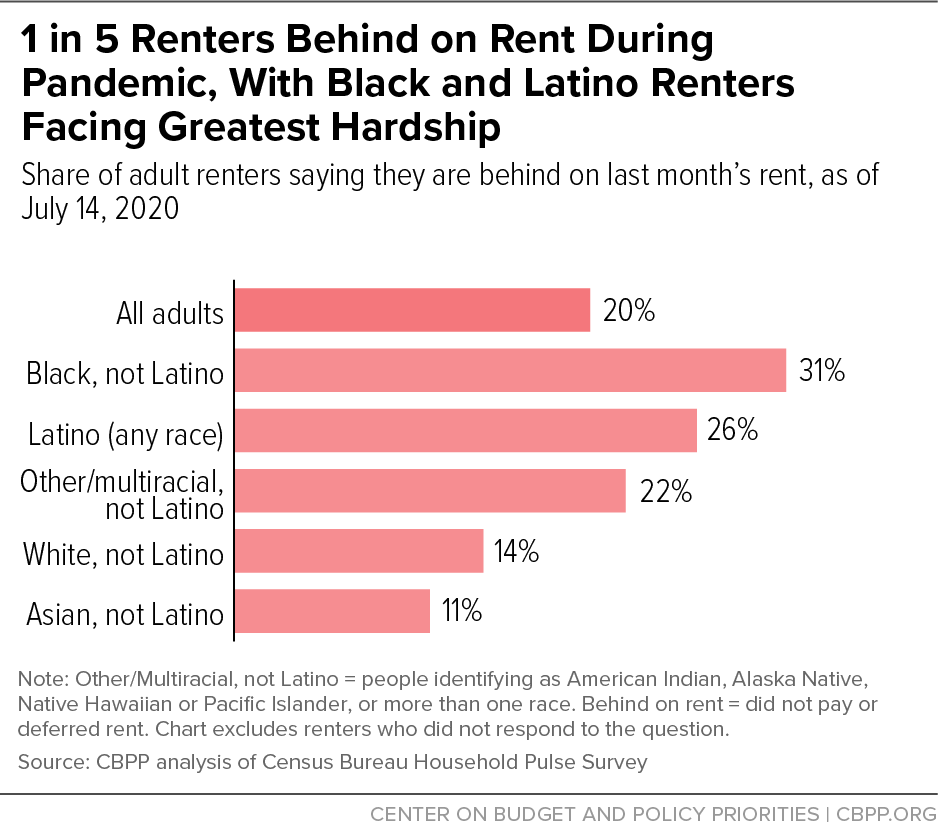BEYOND THE NUMBERS
COVID-19 and the economic crisis have deepened the challenges of individuals and families experiencing homelessness or struggling to pay rent. Consequently, policymakers must include comprehensive housing assistance in the next economic relief package, prioritizing aid for people with the most severe housing needs.
The pandemic has brought serious consequences for those with the fewest resources:
- For people without homes and living on the streets or in emergency shelters, the pandemic has increased health risks and compounded communities’ challenges in helping them to find safe and stable housing.
- Nearly 14 million adults in rental housing — 1 in 5 adult renters — are behind in their rent, according to Census data, and temporary eviction moratoriums that protect some renters from eviction have begun to expire. Moreover, many renters are struggling to pay rent despite the expansion of, and weekly increase in, unemployment benefits in the CARES Act of March.
- Income losses among assisted tenants are also straining federal rental assistance programs, creating budget shortfalls that will force cuts in assistance at a time when growing numbers of unassisted households are likely struggling to pay the rent.
Policymakers must tailor their next steps to address these housing problems. The CARES Act included provisions to mitigate some of these problems, but funding is too low and several key provisions will expire this month, well before the health and economic crises have subsided. If policymakers don’t act, millions of low-income renters and people experiencing homelessness will likely face avoidable evictions, continued homelessness, or other preventable hardships.
Policymakers should draw on the housing provisions of the House-passed Heroes Act, which together constitute a strong, comprehensive approach to preventing evictions and alleviating other hardship among renters during the pandemic. The key elements of this approach include:
- Housing vouchers to provide long-term housing stability. State and local housing agencies are well positioned to identify individuals and families facing the greatest risks of eviction or homelessness and to provide them with rental vouchers that will help them to remain stably housed for the long term. These agencies are equipped to provide emergency housing vouchers to 500,000 at-risk households over the next year, at a five-year cost of about $26 billion. (The Heroes Act includes $1 billion for this purpose, and two bills, H.R. 7084 and S. 4164, would provide $10 billion.)
- Homelessness assistance. State and local agencies need more funding to expand safe, non-congregate shelter options for people experiencing homelessness, revamp their facilities to prevent the spread of the virus, and provide services to help people remain housed and avoid homelessness. The CARES Act provides $4 billion for these purposes, but analysts have concluded that an additional $11.5 billion will be needed to continue and expand these efforts during the pandemic.
- Eviction prevention. Policymakers should couple an extension of the federal eviction moratorium with help paying past, current, and future rent. They should provide significant funding through the Emergency Solutions Grant program for short- and medium-term rental assistance to help people stay in their current homes, avoid accumulating housing-related debt (without leaving landlords responsible for unpaid rent), and avoid eviction when federal, state, and local moratoriums expire.
- Supplemental funding for rental assistance programs to cover increased subsidy costs caused by tenant income losses. Income losses among currently assisted households are raising subsidy costs, and many agencies will have to cut the number of households they assist if they don’t receive additional funding to cover these costs. We estimate that at least $1 billion will be required to address shortfalls in the Housing Choice Voucher program, along with additional funds for public housing and other programs.

